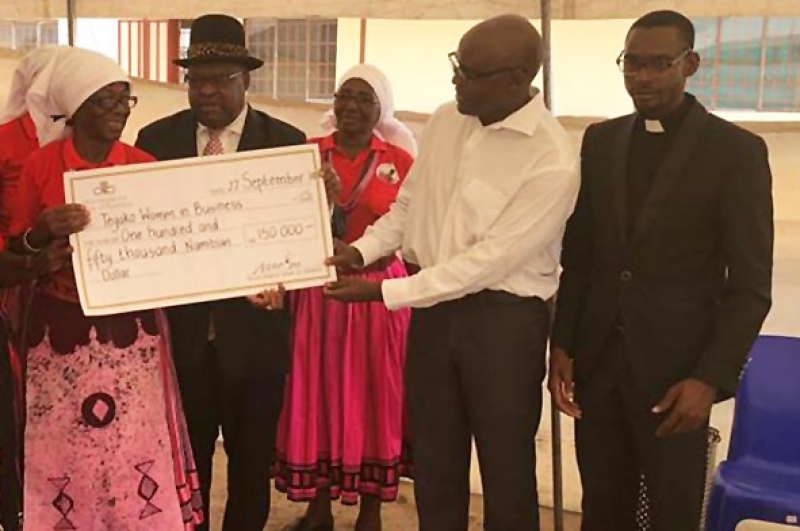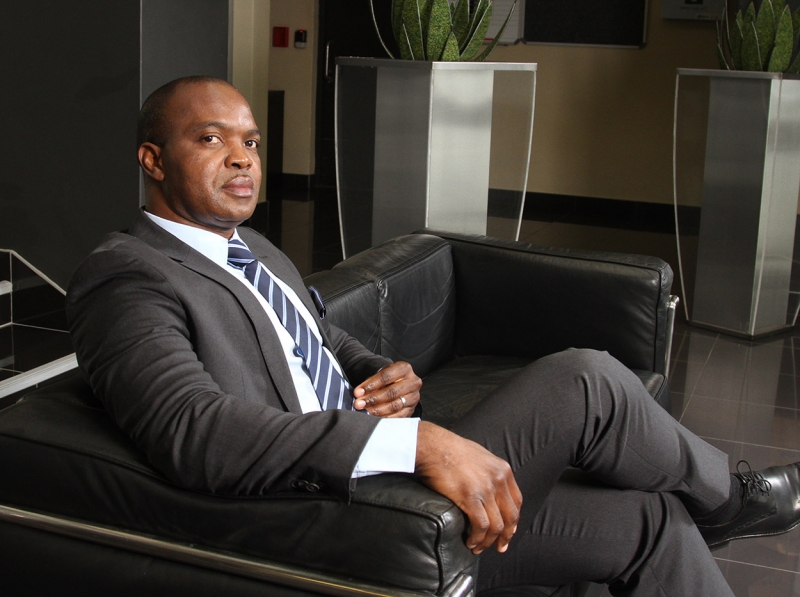 Call 061 290 8000
Call 061 290 8000 Click to mail us
Click to mail us FAQs
FAQs

Development Bank of Namibia (DBN) CEO Martin Inkumbi recently donated on behalf of the Bank N$150,000 for construction of a dam for the Tegako 2020 Women in Business Co-operative. Tegako will use the dam for tilapia farming, as well as for irrigation of an orchard of 500 trees and vegetable plots.
Tegako 2020 Women in Business Co-operative is a group of visionary women from Olulongo in the Oshana Region. The Co-operative, which benefits widows, pensioners, orphans, those living with HIV and aids and others, engages primarily in traditional income generating activities, of which tilapia aquaculture is one.
Martin Inkumbi said, the Bank elected to finance the dam as DBN sees it as having good potential to uplift the livelihood of this group of rural women, their families and the surrounding community.
He said that the dam will provide food security to members of the Tegako Co-operative, and hoped that tilapia catches would be productive enough to also provide an income to Tegako, and make the Co-operative self-sustaining.
Inkumbi also linked Tegako to sustainable agricultural practices. He said that agricultural industry is vital to reduce rural poverty. Rural poverty leads to urban migration, which in turn leads to urban poverty. By promoting prosperity in rural areas and smaller centers the Bank strives to balance socio-economic wellbeing across the regions of Namibia.
Talking about the significance of dams, Inkumbi said that water storage represents a current resource for the economy but is also critical for providing a buffer against drought. The further value of dams lies in catering to the water requirements of future generations. In light of this, Inkumbi said, the Bank makes available finance for water storage infrastructure, such as dams and reservoirs, as well as water distribution infrastructure.
Noting that the Co-operative was established and is managed by women, he said DBN seeks to transform economic participation in favour of women. The Bank is well aware of the critical role of women in providing for their families and the benefits they bring to communities.
The Bank recognises that by providing finance for women entrepreneurs, it will strengthen their opportunities to spread the benefits of their incomes and give them the ability to create opportunities for other Namibians.
Inkumbi concluded by noting that the project fulfils four of the Bank’s six pillars of corporate social investment. The project, he said provides an exemplary means of poverty alleviation but also skills development, community health and environmental benefits. The Bank also provides funding for educational initiatives and improvement of the broader business environment.
The Board of the Development Bank of Namibia has extended the tenure of CEO Martin Inkumbi for another five years. Inkumbi was initially appointed as CEO in 2013 following a period as Acting CEO in the wake of the departure of founding CEO David Nujoma.
During the five years since Inkumbi’s appointment, the Bank’s balance sheet has grown from N$2.3 billion with loans and advances of N$1.7 billion at the end of 2013 to N$8.8 billion with loans and advances of N$7.7 billion at 31 March 2018. The Bank’s core business is to advance development by lending to larger enterprises, SMEs and developers of infrastructure.
In addition to the growth of the Bank’s balance sheet, the Bank has passed two major milestones under Inkumbi’s leadership.
Firstly, the Bank put in place an enterprise-wide risk management framework, which enables it to respond to risks in a prudent and proactive manner, including risks inherent in lending, internal operational risks and the risk posed by external market forces. The framework is primarily geared to enable the Bank to mitigate the higher levels of risk inherent in segments of its balance sheet and commitments that require a higher appetite for risk to achieve the Bank’s targeted levels of development impact.
Secondly the Bank has been able to list an N$2.5 billion bond programme on the Namibian Stock Exchange (NSX). In the first, oversubscribed bond auction, the Bank raised N$291 million. Subsequent private placements raised N$210 million. The programme fulfils the Bank’s mandate to develop financial mechanisms for local investors, and also enables investors to generate returns from development.
Inkumbi describes the first five years of his tenure as a period of ongoing evolution and organizational development. Of particular note is the fact that the Bank grew from a complement of 60 staff in 2013 to 90 staff members at the end of its 2018 year. This is evidence of the increased operational intensity and capacity requirement which has fueled the growth of the Bank’s activities.
Additional facets of the Banks evolution and forward looking policies include pioneering finance for renewable energy generation, and the Environmental and Social Management System that mitigates social and environmental risks of the Bank’s lending activities.
On completing a B.Com with majors in Economics, Management and Finance, from UCT, Martin Inkumbi obtained a Post-Graduate Diploma in Finance and Banking from the University of KwaZulu Natal and an M.Sc in Financial Economics from the University of London.
His career in finance began with a position as a researcher in banking statistics at the Bank of Namibia. After being promoted to Financial Analyst, he joined FNB Namibia as a Corporate Banking Manager. In 2006, he joined DBN in the Lending Department, and worked his way up through the ranks.
DBN Head of Marketing & Corporate Communications, Jerome Mutumba, gives pointers for enterprises facing recessionary challenges
The consoling news is that bad times do not last forever, says Development Bank of Namibia’s Head of Marketing & Corporate Communications, Jerome Mutumba. This he says in reaction to the prevailing tight economic conditions in the domestic economy.
Although it calls for cautious optimism given the marginal improvement shown in the quarterly economic performance as indicated by NSA recently, potentially, better macroeconomic conditions lie ahead. However, Mutumba points out, the fact that recession is cyclical means that it will reoccur, and enterprises must be prepared.
Talking about the impact of the recession on the Bank’s enterprise customers, Mutumba says a large number of borrowers have emerged in good condition, due to their sound business administration and accumulation of savings in their enterprises, however some experienced difficulties.
The importance of good business administration
Those that have experienced difficulties, Mutumba notes, are entrepreneurs who withdrew earnings from their enterprises for immediate personal gratification, rather than using their earnings to save, acquire productive assets and diversify.
The money spent on a luxury car for personal use, Mutumba stresses, comes at a cost to the enterprise.
In the first case, money spent on personal luxury reduces savings which could be used to sustain the enterprise during lean periods. Secondly, those enterprises that did not acquire productive assets now have to rent equipment or outsource processes, eroding vital income streams. Thirdly, lack of revenue applied to diversification makes entrepreneurs dependent on activity in a single sector, rather than being able to spread risk.
Further explaining the point of diversification, Mutumba illustrates it with the impact of the recession and fiscal consolidation on the construction industry. Once the number of tenders was reduced, those contractors who had no other sources of income ran into difficulty. Those that diversified had second sources of income with which to sustain themselves and their activities in form of cross subsidization.
Smart budgeting and cash flow management
Talking about recessionary strategies for enterprises, Mutumba says, the starting point has to be critical examination of the budget and the cash flow projection. Although the immediate reaction of enterprises may be to cut back rapidly, this should be considered in light of medium to long-term loss of capacity and competitive capability.
Instead, Mutumba suggests, spending cuts should preserve the ability to compete by reducing non-essential expenditure. Meaningful reductions might include reducing equipment rental, and overtime as well as placing restrictions on non-essential expenditure such as travel and entertainment.
He also suggests that enterprises negotiate with suppliers and customers to ensure win-win outcomes that are informed by the need for all to be sustainable in challenging situations.
An eye on future growth
However, Mutumba also adds that there are opportunities for enterprises to lay the ground for growth during recession. Those businesses that maintain their market share and competitiveness will benefit from plans laid during the recession.
It is an unfortunate fact that some enterprises will lose ground or even close, and that creates opportunities for others to grow once the recessionary period lifts. The enterprise which emerges from recession is inevitably leaner and better suited to its purpose, and so can be expected to be more competitive.
Development Bank supports sustainability
Talking about DBN’s support to borrowers during recession or in the event of challenges, Mutumba says that the Bank seeks to ensure the sustainability of its borrowers. Subject to the Bank’s risk guidelines, the Bank will attempt to be accommodate and allow its borrowers to recover and attain financial health.
He points out that where enterprises show a strong measure of development impact, as well as the clear prospect of returning to financial health, the Bank may at its own discretion restructure debt.
In addition, the Bank also provides support in the form of mentorship through independent experts, in order to ensure capacity. In the past, the Bank has also provided capacity for strategic interventions to ensure the operability of enterprises with a high development impact.
The precondition for this support, Mutumba says, is a willingness to cooperate with the Bank and disclose challenges.
The lessons of lean times may be difficult to absorb, but with good business administration and a long-term approach to business growth, enterprises can proceed with confidence. The Development Bank will be there to provide support and help, where needed, Mutumba concludes.





